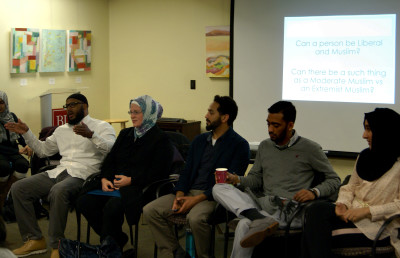
Islam is not a religion of peace nor war, but the Quran is often interpreted out of context, resulting in a culture of Islamophobia, several panelists said at the “#LetsTalkIslam” panel at Boston University’s Howard Thurman Center for Common Ground Thursday.
Approximately 50 BU students and faculty gathered and listened to a panel of five people, including local chaplains, non-profit workers and BU students. Prior to the talk, the Islamic Society of Boston University, the host of the dialogue, collected over a dozen questions on Islam through an anonymous Google Form and the hashtag #LetsTalkIslam on Twitter and Facebook.
A number of questions included the definition of jihad, the differences between moderate and extreme Muslims and Islamic interpretations of feminism and homosexuality.
Taymullah Abdur-Rahman, Muslim chaplain at Harvard University and one of the five panelists, said defining Islam as a religion of either peace or war equates to defining European imperialism as either peace or war.
“It is a dangerous thing to ask what jihad means to you,” Abdur-Rahman said during the talk. “To us who are civilized, there are good interpretations. Those who are behaving like barbarians might have different interpretation of jihad.”
When asked about whether Muslim extremists can reconcile with God, Ebraheim Ismail, chaplain of ISBU, explained that there are many principles that Muslims should follow. Removal of harm is one of them, he said.
“There are do’s and don’ts. We are told to pray five times a day, to fast a month following the lunar calendar, to not harm someone with no particular reasons,” Ismail said during the talk. “There are fundamentals of just do’s and don’ts … you have the right to prevent some people from harming you, but you do not harm others.”
The Quran states homosexuality is a sin, and Muslims do not deny it, but individuals have unique moral viewpoints built on mutual respect, said Syed Ali, a senior in the Frederick S. Pardee School of Global Studies and former ISBU president.
“Homosexuality has existed for centuries. We do not see loving someone as a sin,” Ali, one of the panelists, said. “But we do think that, to put it bluntly, the sin is the way of physical contact. It is my responsibility as a Muslim to hold on to my opinion, not to press my opinion on the entire American society.”
Asked whether Islamic teaching is compatible with feminism, BU alumna Lisa Tobias said wearing hijabs allows people to pay attention to a woman’s intelligence and character, instead of appearances. Tobias said she converted to Islam in her early 20s.
“[After converting to Islam,] my mother hated the hijab because of what people think it represents,” Tobias said at the panel. “The purpose of wearing hijab is so that woman will be recognized and not harmed. Women in America focus too much on how they look. Hijab is taking that culture away. My spirit is more important than my body, and my body is nobody’s but mine.”
Taiba Zahir, a junior in the Sargent College of Health and Rehabilitation Sciences and current ISBU president, said the event was a success in helping the BU community gain a better understanding of Islam.
“Our purpose was just trying to be open and creating an open forum with knowledgeable and diverse speakers for people to come with any question,” Zahir said after the panel. “To be there and to answer their questions especially when there is Islamophobia, we achieved our goal to create a genuine conversation.”
Several student attendees said the panelists gave them a lot of information and they believe a more culturally literate community is crucial to defeat Islamophobia.
Faridat Ilupeju, a sophomore in College of General Studies, said the panelists did a great job answering difficult questions.
“I was a little disappointed there weren’t more people to come, because it is a shame to see a lot of people asked about these questions and weren’t here to hear the answer,” Ilupeju said.
Nadea Zahra, a senior in the Questrom School of Business on the E-board of ISBU, said conversations during the panel clarified several misconceptions about Muslims.
“It was a really good event to address the confusion between what is the real Islam and what is the Islam that the media covered,” Zahra said. “It is better for society to hear what real Islam is from Islamic people.”














